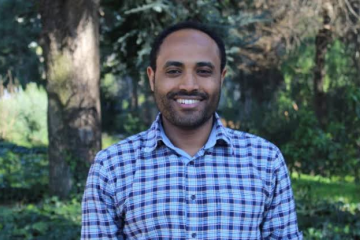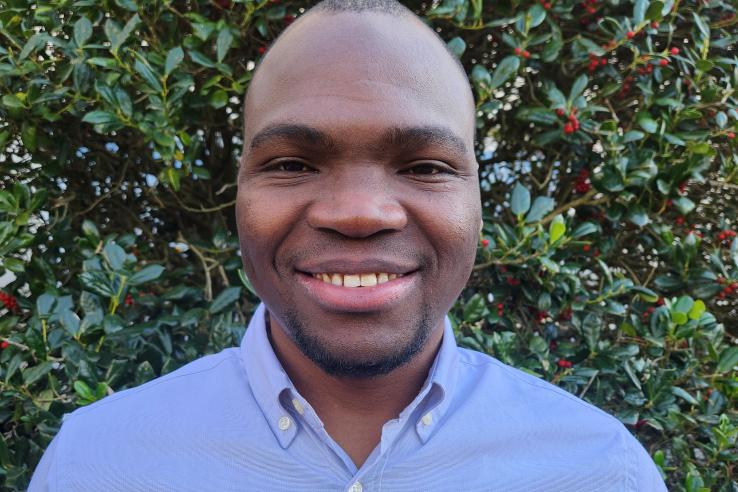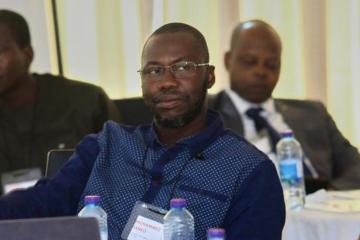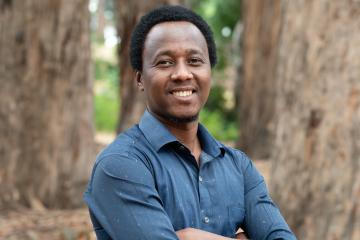
African Scholar Spotlight: Lazare Kovo

This post is part of our ongoing series showcasing the work and perspectives of economists from the African continent who are leading randomized evaluations. Through our African Scholars Program, we hope to help create more opportunities for African researchers to advance the research agenda on the continent through randomized evaluations. In this spotlight, we speak with Solomon Lazare Kovo from Emory University.
What drew you into the field of development economics and in particular, working with impact evaluations?
My interest in development economics—and in particular, impact evaluations—stems from a combination of personal experiences and a deep desire to contribute to more effective and equitable development policies.
Growing up in Benin, where economic insecurity shaped everyday choices, I became keenly aware of the structural barriers that limit opportunities for millions of people. That early exposure made the challenges of poverty and inequality not just abstract issues, but lived realities. It also instilled in me a strong desire to be part of a solution, not by intuition or good intentions alone, but through approaches grounded in evidence. Development economics offers a unique space where analytical rigor meets urgent, real-world challenges. Impact evaluation provides the tools to ask not just what is being done, but what works, why, and for whom.
I am drawn to impact evaluations, not just as academic exercises, but as ways to inform policies that are scalable, cost-effective, and transformative. I was especially inspired by the many fieldwork opportunities I was involved in during my predoctoral fellowship at the African School of Economics, where I saw firsthand the power of data to uncover not only the outcomes of interventions but the mechanisms behind their success or failure. Working alongside communities, governments, and NGOs, I want to help bridge the gap between research and practice—ensuring that policy decisions are guided by careful evaluation and grounded in the lived realities of the people they’re meant to serve.
What are your broad research interests?
I am a scholar of political economy and development. As a political economist, I study the relationship between political institutions and economic development, with a particular interest in the conditions under which institutions—whether well-functioning or not—can still align politicians' and citizens’ preferences. I also engage with governance questions in contexts facing democratic erosion, examining innovative practices that enhance fiscal and bureaucratic state capacity, accountability, and development outcomes.
As a development economist, my work focuses on education and labor. I explore how labor market rigidities interact with gender gaps in education, labor force participation, social inclusion, and the political consequences of labor market inequality. My research employs mixed methods, with a strong emphasis on rigorous causal inference and experimental design.
What are you using initiative funds to do? What research question are you trying to answer, and how does it relate to your context?
I am using the funds to pilot two studies in Benin, titled “Combining apprenticeship and formal education as an insurance device to reduce gender gap in educational outcomes” and “Can gender-responsive pedagogy and weekly office hours in STEM courses reduce gender gaps in school participation and STEM fields?” with support from J-PAL’s Learning for All Initiative (LAI).
The first study is motivated by the fact that in sub-Saharan Africa, secondary school completion rates remain low, especially for girls. The gender gap persists even in countries where secondary education is free. This is not driven by parents’ lack of interest in investing in their daughter’s future: many of them pay for costly apprenticeships with, e.g., hairdressers, beauticians, and fashion designers. Anecdotal evidence suggests that parents expect higher returns from apprenticeships than from formal education, in terms of future employability. This creates a stark tradeoff, where girls miss out on acquiring formal human capital to acquire experience. This may contribute to the persistent gender gap in labor earnings. The first project proposes to reduce this tradeoff by integrating vocational training into formal education. The goal is to increase girls’ formal education levels while maintaining their ability to transition into the labor market.
The second study focuses on gender imbalances in STEM fields, where the gap between girls and boys widens annually, limiting girls' participation in computing and technology, key drivers of innovation and economic growth. The study will (1) introduce gender-responsive pedagogy in STEM courses to reduce barriers and create an inclusive, stereotype-free learning environment and (2) organize weekly office hours for STEM courses to encourage girls' participation and commitment to technology and computing sectors. By fostering educational equity and gender equality, this study aligns with global efforts to innovate traditional teaching practices and increase girls' participation, retention, and success in STEM disciplines.
What do you see are the big unanswered research questions in your context that randomized evaluations may be able to help answer? Does this relate to any projects you are excited to work on in the future?
Several big questions that are policy-relevant remain unanswered in the literature, and rigorously designed randomized evaluations can help answer them. Below, I present a few of these big questions.
First, how do we ensure foundational learning for all, at scale? Despite increased enrollment, many students leave primary school without basic literacy and numeracy skills. Second, many sub-Saharan African countries have narrowed gender gaps in enrollment—but disparities persist in completion, learning, and post-school outcomes. Building on my current research on gender gaps in education, how can we close gender gaps in education beyond access? Third, youth unemployment remains high despite rising educational attainment. How can education systems better align with labor market demands? Fourth, many sub-Saharan African countries face recurrent disruptions to schooling. How can we build resilient education systems in the face of conflict, climate change, and shocks? Fifth, systemic issues like corruption, poor planning, and weak accountability undermine service delivery. What institutional reforms are needed to improve governance and accountability in education?
My research agenda on education and labor tackles these questions. Addressing these questions is an endeavor that would drastically improve our understanding of how education works, when, why, and for whom, especially in sub-Saharan Africa. It would also help assess the impacts of context-dependent innovative interventions that would improve not only access and learning for all but also learners' transition to employment.
How has the support you have received from J-PAL to date assisted you in your career? How can organizations like J-PAL continue to build on the support they provide to local researchers in running randomized evaluations?
The support I have received from J-PAL has been instrumental in advancing my research agenda and shedding light on critical issues in education and labor. I see J-PAL’s support not only as a source of funding, but as a powerful signal—one that has helped position me within the community of development economists using rigorously designed impact evaluations and innovative interventions to address policy-relevant challenges.
This was not a path I imagined possible, given the financial constraints that many African scholars face in conducting meaningful research. I intend to build on this momentum to further develop my career as both a political economist and a development economist.
I strongly encourage J-PAL and similar organizations to expand their efforts to support African scholars in implementing high-impact, policy-relevant research. Scholars on the continent—myself included—are asking important, locally grounded questions that have far-reaching implications for how we understand and address development challenges. Yet access to sustained research funding remains a major obstacle.
While J-PAL and others have made commendable strides in increasing opportunities for African researchers, many locally led projects struggle to move beyond the pilot phase. I believe it is critical that organizations like J-PAL help bridge this gap by prioritizing successful pilot projects led by local researchers for scale-up funding. Where needed, these efforts can be supported through collaborative partnerships with more experienced researchers, ensuring that promising ideas are not only tested but fully developed and translated into impact at scale.
Do you have advice to offer other young aspiring African scholars thinking about a career in economic research?
Economics is one of the most powerful disciplines in the social sciences, and research at its core is about identifying and addressing real-life, pressing challenges. In this endeavor, careful observation and lived experience are essential—they shape the intuition and insight needed to conceptualize meaningful questions and design rigorous economic research. My advice to young African Scholars aspiring to build a career in economic research is threefold:
- Start by grounding yourself in the problems that matter most to your community. Some of the most impactful economic research begins not with abstract theory, but with a deep understanding of real-world challenges—be it unemployment, education gaps, corruption, or access to healthcare. Use your lived experience as a strength: it helps you ask the right questions and keeps your research relevant.
- Build technical skills and seek mentorship. Invest early in mastering the core tools of economic research—statistics, econometrics, programming (e.g., R, Stata, Python), and academic writing. At the same time, seek out mentors—professors, researchers, or peers—who can guide you, critique your work, and open doors. Don’t hesitate to reach out to researchers you admire; many are happy to support emerging Scholars, especially those with commitment and curiosity.
- Stay connected, stay curious, and stay grounded. Research can sometimes feel isolating, but you don’t have to do it alone. Join academic networks like J-PAL Africa, African Economic Research Consortium, or Research for Development. Attend workshops, read widely, and collaborate when you can. Most importantly, remain curious and open to learning, while staying grounded in the idea that research is a tool—not an end in itself—but a means to serve communities and inform better policy.
Finally, don’t be discouraged by setbacks. Research is a long game. Be persistent, ask bold questions, and believe that your perspective as an African Scholar is not only valid but essential to the future of global development thinking.
What advice would you give to scholars who are considering applying to J-PAL for funding?
J-PAL is one of the few research institutions that actively promotes equity and inclusion in academia by expanding funding opportunities for African scholars to lead policy-relevant, rigorously designed impact evaluations. However, the funding process—particularly at the pilot stage—is highly competitive.
For scholars considering applying, it is essential to ensure that your project clearly meets three key criteria:
- A clearly defined and relevant development challenge grounded in local context and evidence.
- An innovative and practical solution that directly addresses the identified issue.
- A rigorous research design that tests well-motivated hypotheses based on a clearly articulated theory of change, showing how your intervention leads to the intended outcomes.
In addition, applicants should engage with local implementation partners early, anticipate logistical challenges, and be open to feedback from the J-PAL team and reviewers. Persistence, clarity of purpose, and alignment with policy priorities are critical to success.
What are some of the key mistakes you made in your early applications?
One key mistake I made early on was underestimating how clearly the core elements of the project need to be articulated. In some of my first applications, I had promising ideas, but I struggled to clearly connect the development challenge to the proposed solution and the theory of change. Reviewers couldn’t always see the causal logic that felt intuitive to me.
A second mistake was being too ambitious without grounding the project in practical constraints. I sometimes designed research that was conceptually exciting but underestimated the logistical complexity, local capacity requirements, or the timeline needed to execute the plan.
These experiences taught me that a strong application is not just about having a good idea, but about presenting a clear, focused, and feasible research plan grounded in local realities and connected to pressing policy questions.
What surprised you the most about how the funding process works?
What surprised me most about the funding process is the level of technical detail required in the application process. Compared to my first experience with LAI’s third funding round in 2024, the expectations were significantly higher for the fourth round in 2025. The application included several new sections with lengthy narratives, and for the first time, we were required to submit a power calculation for a pilot project.
To meet this requirement, my team and I had to gather administrative data on at least one or two key outcomes in order to estimate minimum detectable effects and determine appropriate sample sizes. This step added a layer of rigor that we hadn’t fully anticipated and required us to invest more time and coordination than initially planned.
We found ourselves working harder than expected to both meet the technical requirements and still craft a compelling research narrative. In the end, though, the process pushed us to sharpen our design and better align our proposal with LAI’s goals, which ultimately made the project stronger.

